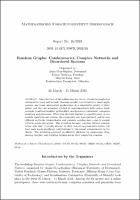Zusammenfassung
Since the turn of the millennium the theory of random graphs has advanced by leaps and bounds.
Random graphs have found very many applications, and many unexpected applications, in a remarkable variety of disciplines, and they are nowadays studied by mathematicians with various backgrounds (combinatorialists, probabilists, mathematical physicists), computer scientists and physicists.
While this diversity has led to a proliferation of new models, questions and results, the community also has shattered, and by now different methods, terminologies and research agendas have come to coexist without much interaction.
The workshop brought together distinct communities, who don't typically interact at their own intra-community events, but have each made significant contributions to the recent advancements in the theory. The workshop provided an effective platform for exchanging ideas, sharing insights, and building bridges across their respective domains.

